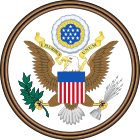Fraud Enforcement and Recovery Act of 2009 facts for kids
 |
|
| Long title | An act to improve enforcement of mortgage fraud, securities fraud and commodities fraud, financial institution fraud, and other frauds related to Federal assistance and relief programs, for the recovery of funds lost to these frauds, and for other purposes. |
|---|---|
| Acronyms (colloquial) | FERA |
| Enacted by | the 111th United States Congress |
| Effective | May 20, 2009 |
| Citations | |
| Public law | 111-21 |
| Statutes at Large | 123 Stat. 1617 |
| Codification | |
| Titles amended | 18, 31 |
| U.S.C. sections created | 18 USC §27 |
| U.S.C. sections amended | 18 USC §20 18 USC §1014 18 USC §1031(a) 18 USC §1348 18 USC §1956(c) 18 USC §1957(f) 31 USC §3729 31 USC §3730(h) 31 USC §3731(b) 31 USC §3732 31 USC §3733 |
| Legislative history | |
|
|
The Fraud Enforcement and Recovery Act of 2009, also known as FERA, is a public law in the United States. It was put into effect in 2009. This law made it easier to catch and punish people who commit fraud. It focused especially on fraud related to banks, home loans (mortgage fraud), and investments (securities fraud).
Contents
How a Bill Becomes Law: The FERA Story
This law started as a bill in the United States Senate. Patrick Leahy, a Senator from Vermont, introduced the bill. He was the chairman of the United States Senate Committee on the Judiciary, which handles laws about justice.
Senate Votes on the Bill
On April 27, 2009, the Senate voted to move forward with the bill. The vote was 84 to 4, meaning most Senators agreed to continue. Only four Senators voted no, all from the Republican Party.
The next day, April 28, the Senate officially voted on the bill. It passed with a strong vote of 92 to 4. This showed that many Senators supported the new law.
House of Representatives Weighs In
After the Senate, the bill went to the United States House of Representatives. On May 6, the House passed the bill with some changes. The vote was 367 to 59.
Most Democrats and many Republicans in the House voted yes. All the "no" votes came from Republicans.
Final Approval and Presidential Signature
The Senate then made a small change to the House's version of the bill. The House agreed to this final version on May 18, with a vote of 338 to 52. Again, most Democrats and many Republicans voted for it.
Finally, President Barack Obama signed the bill into law on May 20, 2009. This made it an official law of the United States.
What FERA Changed About Fraud Laws
The Fraud Enforcement and Recovery Act made important updates to how the government fights fraud. It helped close loopholes and make sure more types of fraud could be investigated.
Defining Financial Institutions
One big change was how the law defined a financial institution. Before FERA, some types of businesses that handled money, like private companies that give out home loans, were not fully covered by federal fraud laws.
FERA added these "mortgage lending businesses" to the definition. This meant that if someone lied on a loan document for a home loan, it became a federal crime.
Cracking Down on Government Fraud
The law also updated rules about major fraud against the United States government. Before FERA, this mainly covered fraud in government purchases.
FERA expanded this to include fraud related to government grants and special programs. This included money from programs like the American Recovery and Reinvestment Act of 2009.
Updating Securities Fraud Rules
FERA also changed the definition of securities fraud. This type of fraud involves dishonest actions related to investments.
The law now included fraud related to "commodities futures" and "options." These are types of financial agreements that involve buying or selling things like oil or corn at a future date.
Funding to Fight Fraud
To help agencies catch more fraud, FERA provided extra money. This funding was for the federal fiscal years starting in October 2009 and 2010.
- The Department of Justice received an extra $165 million.
- The Postal Inspection Service and the Office of the Inspector General at the United States Department of Housing and Urban Development each got $30 million.
- The Secret Service received $20 million.
- The Securities and Exchange Commission got $21 million.
This extra money helped these agencies hire more people and get better tools to investigate fraud.
Creating the Financial Crisis Inquiry Commission
FERA also created a special group called the Financial Crisis Inquiry Commission. This group was made up of members chosen by both the Senate and the House of Representatives.
The main goal of this commission was to study why the United States had a big financial and economic crisis. They looked at both national and global reasons for the crisis.
 | Leon Lynch |
 | Milton P. Webster |
 | Ferdinand Smith |

